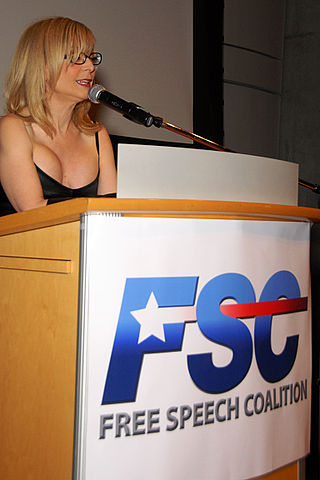Related Research Articles
The Millertest, also called the three-prong obscenity test, is the United States Supreme Court's test for determining whether speech or expression can be labeled obscene, in which case it is not protected by the First Amendment to the United States Constitution and can be prohibited.

Pornographic films (pornos), erotic films, adult films, sex films, 18+ films, or also known as blue films, are films that represent sexually explicit subject matter in order to arouse, fascinate, or satisfy the viewer. Pornographic films represent sexual fantasies and usually include erotically stimulating material such as nudity (softcore) and sexual intercourse (hardcore). A distinction is sometimes made between "erotic" and "pornographic" films on the basis that the latter category contains more explicit sexuality, and focuses more on arousal than storytelling; the distinction is highly subjective.

Hardcore pornography or hardcore porn is pornography that features detailed depictions of sexual organs or sexual acts such as vaginal, anal, oral or manual intercourse, ejaculation, and fetish play. The term is in contrast with less-explicit softcore pornography. Hardcore pornography usually takes the form of photographs, films, and cartoons. Since the mid-1990s, hardcore pornography has become widely available on the internet, making it more accessible than ever before.

Pornography has existed since the origins of the United States, and has become more readily accessible in the 21st century. Advanced by technological development, it has gone from a hard-to-find "back alley" item, beginning in 1969 with Blue Movie by Andy Warhol, the Golden Age of Porn (1969–1984) and home video, to being more available in the country and later, starting in the 1990s, readily accessible to nearly anyone with a computer or other device connected to the Internet. The U.S. has no current plans to block explicit content from children and adolescents, as many other countries have planned or proceeded to do.

Alisha Klass is a former American pornographic actress.
The National Child Victim Identification Program (NCVIP) is the world's largest database of child pornography, maintained by the Child Exploitation and Obscenity Section (CEOS) of the United States Department of Justice and the National Center for Missing and Exploited Children (NCMEC) for the purpose of identifying victims of child abuse.

The Free Speech Coalition (FSC) is a non-profit trade association of the adult entertainment industry in the United States. Founded in 1991, it opposes the passage and enforcement of obscenity laws and many censorship laws.
Pornography is sexual subject material such as a picture, video, text, or audio that is intended for sexual arousal. Made for consumption by adults, pornographic depictions have evolved from cave paintings, some forty millennia ago, to modern virtual reality presentations. A general distinction of adult-only sexual content is made by classifying it as pornography or erotica.
The National Center on Sexual Exploitation (NCOSE), previously known as Morality in Media and Operation Yorkville, is an American conservative anti-pornography organization. The group has also campaigned against sex trafficking, same-sex marriage, sex shops and sex toys, decriminalization of sex work, comprehensive sex education, and various works of literature or visual arts the organization has deemed obscene, profane or indecent. Its current president is Patrick A. Trueman. The organization describes its goal as "exposing the links between all forms of sexual exploitation".

The term "Golden Age of Porn", or "porno chic", refers to a 15-year period (1969–1984) in commercial American pornography, in which sexually explicit films experienced positive attention from mainstream cinemas, movie critics, and the general public. This American period, which subsequently spread internationally, and that began before the legalization of pornography in Denmark on July 1, 1969, started on June 12, 1969, with the theatrical release of the film Blue Movie directed by Andy Warhol, and, somewhat later, with the release of the 1970 film Mona produced by Bill Osco. These films were the first adult erotic films depicting explicit sex to receive wide theatrical release in the United States. Both influenced the making of films such as 1972's Deep Throat starring Linda Lovelace and directed by Gerard Damiano, Behind the Green Door starring Marilyn Chambers and directed by the Mitchell brothers, 1973's The Devil in Miss Jones also by Damiano, and 1976's The Opening of Misty Beethoven by Radley Metzger, the "crown jewel" of the Golden Age, according to award-winning author Toni Bentley. According to Andy Warhol, his Blue Movie film was a major influence in the making of Last Tango in Paris, an internationally controversial erotic drama film, starring Marlon Brando, and released in 1972, three years after Blue Movie was shown in theaters.
Child erotica is non-pornographic material relating to children that is used by any individuals for sexual purposes. It is a broader term than child pornography, incorporating material that may cause sexual arousal such as nonsexual images, books or magazines on children or pedophilia, toys, diaries, or clothes. Law enforcement investigators have found that child erotica is often collected by pedophiles and child sexual abuse offenders. It may be collected as a form of compulsive behavior and as a substitute for illegal underage pornography and is often a form of evidence for criminal behavior.
Father Morton A. Hill, S.J. (1917-1985) was a leader of the campaign against pornography in the 1960s, 1970s and 1980s. He was one of the founders of Morality in Media, which was created in 1962 to fight pornography. President Lyndon B. Johnson appointed him to the President's Commission on Obscenity and Pornography.

Leonidas Ralph Mecham was the former Director of the Administrative Office of the United States Courts, having served in that position from 1985 to 2006. He was appointed to the position by United States Chief Justice Warren Burger in July 1985.
Internet pornography is any pornography that is accessible over the Internet; primarily via websites, FTP connections, peer-to-peer file sharing, or Usenet newsgroups. The greater accessibility of the World Wide Web from the late 1990s led to an incremental growth of Internet pornography, the use of which among adolescents and adults has since become increasingly popular.
An obscenity is any utterance or act that strongly offends the prevalent morality of the time. It is derived from the Latin obscēnus, obscaenus, "boding ill; disgusting; indecent", of uncertain etymology. Generally, the term can be used to indicate strong moral repugnance and outrage in expressions such as "obscene profits" and "the obscenity of war". As a legal term, it usually refers to descriptions and depictions of people engaged in sexual and excretory activity.
In the United States, distribution of "obscene, lewd, lascivious, or filthy" materials is a federal crime. The determination of what is "obscene, lewd, lascivious, or filthy" is up to a jury in a trial, which must apply the Miller test; however, due to the prominence of pornography in most communities most pornographic materials are not considered "patently offensive" in the Miller test.

In the United States, child pornography is illegal under federal law and in all states and is punishable by up to life imprisonment and fines of up to $250,000. U.S. laws regarding child pornography are virtually always enforced and amongst the sternest in the world. The Supreme Court of the United States has found child pornography to be outside the protections of the First Amendment to the United States Constitution. Federal sentencing guidelines on child pornography differentiate between production, distribution, and purchasing/receiving, and also include variations in severity based on the age of the child involved in the materials, with significant increases in penalties when the offense involves a prepubescent child or a child under the age of 18. U.S. law distinguishes between pornographic images of an actual minor, realistic images that are not of an actual minor, and non-realistic images such as drawings. The latter two categories are legally protected unless found to be obscene, whereas the first does not require a finding of obscenity.
An anti-pornography movement in the United States has existed since before the 1969 Supreme Court decision of Stanley v. Georgia, which held that people could view whatever they wished in the privacy of their own homes, by establishing an implied "right to privacy" in U.S. law. This led President Lyndon B. Johnson, with the backing of Congress, to appoint a commission to study pornography. The anti-pornography movement seeks to maintain or restore restrictions and to increase or create restrictions on the production, sale or distribution of pornography.
Feminists Fighting Pornography was a political activist organization against pornography. It advocated for United States Federal legislation to allow lawsuits against the porn industry by women whose attackers were inspired by pornography. FFP was based in New York, N.Y., was founded in 1983 or 1984, and dissolved in 1997.
Paul Michael Warner is an American lawyer who served as a United States magistrate judge for the United States District Court for the District of Utah. He was appointed to this position on February 19, 2006. He retired in 2020.
References
- Julie Cart. "As Utah Takes Aim at Smut, the Internet Is Job 1", LA Times, March 25, 2001
- Marco R. della Cava. "Utah Lawyer Turns 'porn czar'", USA Today, March 5, 2001